
A Labour of Love
Gianni Vacca
Part Two: Creating Characters
Characteristics
Since Timinits & Trolls is about adventurers (they call them delvers in Umathela), the game rules will be centred on the numerical characteristics that define the player characters. Each characteristic is actually a blanket term covering any skills the delver may have in the particular field evoked by the name of the characteristic.Starting delvers have characteristics in the 3-18 range because they are rolled on 3D6. Lucky players may have a higher starting value, though (see CHARACTER GENERATION below).
All Umathelan delvers are human. Non-human characters’ characteristics can be deduced from the creature descriptions in the CREATURES section (q.v.).
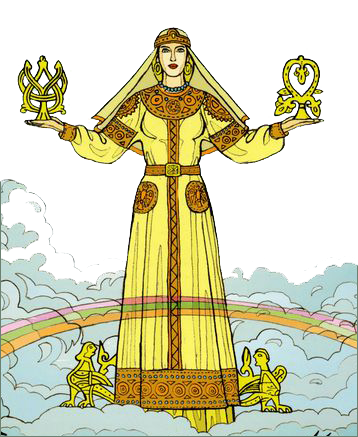
The ten characteristics are:
Strength (STR)
Constitution (CON)
Intelligence (INT)
Power (POW)
Dexterity (DEX)
Charisma (CHR)
Knowledge (KNW)
Perception (PER)
Speed (SPD)
Luck (LK)
(Note that PER and KNW are new characteristics, not part of the Original T&T game.)
STR covers any skills that involve the exertion of brute force, like swinging an axe, forcing open a closed door, lifting a heavy object…
CON covers any skills related to resisting physical attacks, wounds, illnesses, poison, and recovering from the same.
INT covers skills related to innate intelligence (as opposed to learning) such as reasoning, memorising, solving riddles or puzzles, and playing clever games such as chess.
POW is the measure of how attuned the delver is with the dwimmer-craft that the magical world of Glorantha is infused with. POW is different from the other characteristics insofar as it does not correspond to a set of skills but rather to a pool of ‘points’ used to fuel spells.
DEX covers any skills that involve physical agility, eye-hand co-ordination, and more generally precision, meaning most manual skills at the end of the day.
CHR covers all inter-personal skills, such as commanding, seducing, cajoling…
KNW covers skills related to learning and education, and more generally intellectual skills that are not innate.
PER covers any skills related to awareness to one’s environment and to the five senses.
SPD despite its name, SPD is not physical speed (as in running) but reflexive speed: this characteristic covers initiative, resisting being surprised, etc.
LK covers any skills not covered by the other characteristics.
Something that must be kept in mind is that the player is free to choose between several applicable characteristics for a given skill roll (see SKILL ROLLS below).
Delh the Delver is introduced to a high chieftain, and he’s looking for the right words to say to please him – the player is free to make either a CHR or a KNW roll.
Losing Characteristic Points
Over the course of their adventures, delvers may lose characteristic points; mostly CON (through combat) and POW (by casting spells).Should he lose STR characteristic points and reach 0, then a delver passes out. Any further STR characteristic point lost is taken off his CON.
Should he lose CON characteristic points and reach 0, then a delver is in a coma. Any further CON characteristic point lost counts towards negative CON. When the CON reaches -10, the delver is dead.
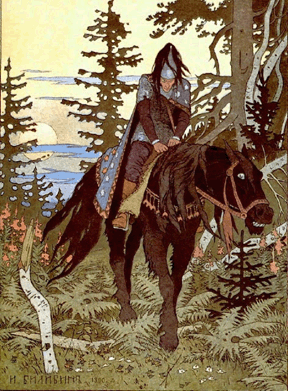
Recovering Characteristic Points
Characteristic points (except CON) are regained at the rate of 1 characteristic point per 10 minutes spent in non-strenuous activity; this typically means nothing more taxing than walking.Damage to CON characteristic points is recovered at the rate of 1 characteristic point per day of absolute rest (unless magic is used to speed the healing process). This mostly means that CON characteristic points may only be regained between adventures.
Monsters recover lost Monster Rating points at the rate of 1 MR point per 10 minutes spent in non-strenuous activity.
Increasing Characteristics
Increasing a characteristic by +1 costs 10 times the current characteristic rating in Adventure Points. Delh the Delver has a KNW rating of 8. Bringing it up to 9 would cost him 80 Adventure Points.POW can only be increased by Acolytes, Alchemists, Priests, Specialist Mages, Templars, and Wizards. Delvers from other character class cannot increase their POW.
Starting Age
The starting age for human delvers is 10+3D6 years.
Height and Weight
The player can either choose them, or roll 3D6 and consult the table below:| Roll | Height | Weight |
| 3 | 1.22m/4’ | 34kg/75 lb |
| 4 | 1.30m/4’3" | 41kg/90 lb |
| 5 | 1.35m/4’5" | 48kg/106 lb |
| 6 | 1.42m/4’8" | 54kg/119 lb |
| 7 | 1.47m4’10" | 61kg/134 lb |
| 8 | 1.55m/5’1" | 68kg/150 lb |
| 9 | 1.60m5’3" | 73kg/160 lb |
| 10 | 1.68m/5’6" | 77kg/170 lb |
| 11 | 1.73m/5’8" | 82kg/180 lb |
| 12 | 1.80m/5’11" | 86kg/190 lb |
| 13 | 1.85m/6’1" | 91kg/200 lb |
| 14 | 1.93m/6’4" | 102kg/225 lb |
| 15 | 1.98m/6’6" | 113kg/250 lb |
| 16 | 2.06m/6’9" | 127kg/280 lb |
| 17 | 2.11m/6’11" | 141kg/310 lb |
| 18 | 2.18m/7’2" | 159kg/350 lb |
Weight Possible
This is 100 times STR. It measures how many ‘weight units’ a delver can haul around (20 weight units correspond to 1kg/2 lb).
Combat Adds
Combat Adds for delvers are computed using the following characteristics: STR, DEX, SPD, LK.
Each characteristic STR/DEX/SPD/LK point lower than 9 yields -1.
Each characteristic STR/DEX/SPD/LK point higher than 12 yields +1.
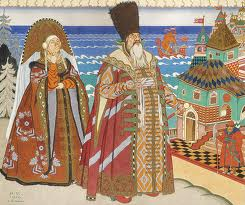 Money and Equipment
Money and Equipment
A character just beginning a career as a delver won’t have many possessions. Umathings are expected to come with the equipment that befits their character class. City-dwellers have a certain amount of money that they can use to buy their starting equipment.
Starting Possessions for Umathings
| Clothing | Equipment |
| Tunic | Belt knife |
| Breeches/kilt | Fire making gear |
| Sandals/boots | Snares |
| Underwear (usually loin cloth) | Drinking skin |
| Warm cloak/coat | Basic camp gear |
| Headgear/hat/cap | Torches |
Starting Money for City-Dwellers
| D100 | Background | Money |
| 01-25 | Umathing Townsman | D100 guilders |
| 26-60 | Malki Townsman | 2D100 guilders |
| 61-85 | Transient Umathing | D100 guilders |
| 86-95 | Poor Noble | 5D100 guilders |
| 96-99 | Rich Noble | 10D100 guilders |
| 00 | Very Rich Noble | 20D100 guilders |
Character Level
A delver’s Level is a measure of how good his skills are. A delver rises in level because his skills have improved, and not the other way round as in some other role-playing games…A delver’s Level is computed by looking at his highest Primary Characteristic (which depends on his archetype, see CHARACTER GENERATION below). If this value falls within the ranges shown below for a given Character Level, then the delver is considered to be of that Character Level.
| Highest Primary Characteristic | Character Level |
| 1-19 | 1 |
| 20-29 | 2 |
| 30-39 | 3 |
| 40-49 | 4 |
| Each +10 | +1 |
Level Benefits
Skill Roll Bonus
A delver always adds his level on skill rolls on one of his Primary Characteristics.Delh the Delver is a 1st level Jack-of-all-trades: he may add +1 to all his skill rolls on INT, POW, DEX, and LK.
Talent Increases
Every time a character raises a Primary Characteristic by +1, then all Talents based on that given characteristic also increase by an amount equal to the character’s level.Al the Alchemist has DEX 12; it is the base characteristic for his Alchemy Talent of 15. Al has gradually increased his KNW to 30 and is thus now a 3rd level Alchemist. Al spends 120 Adventure Points to bring up his DEX to 13. His Alchemy Talent (based on DEX) is also automatically brought up to 15+3=18.
New Talent
Every time a character goes up a level, he can pick up a new Talent.
Character Generation
First and foremost, the player rolls 3D6 for each of the ten characteristics, in the 1 to 10 order outlined above.Should the player roll any triples, he keeps the value, re-rolls the dice, and adds the second value to the first one. This is open-ended, i.e., if the second roll is also a triple, it calls for a third roll, etc.
The next step is choosing the character’s archetype. This choice is restricted by the character’s cultural/ethnic background, and must hence be discussed with the game master.
There are broad archetypes, and narrow archetypes.
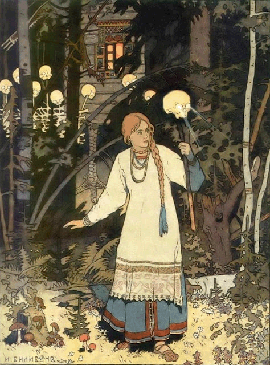 Broad archetypes correspond to well-known character archetypes found in fantasy fiction. They have an easy-to-grasp set of talents, and are thus suggested for novice players or for those unfamiliar with Glorantha. The following broad archetypes are available for Timinits & Trolls: Jack-of-all-trades, Journeyman, Soldier, and Wizard.
Broad archetypes correspond to well-known character archetypes found in fantasy fiction. They have an easy-to-grasp set of talents, and are thus suggested for novice players or for those unfamiliar with Glorantha. The following broad archetypes are available for Timinits & Trolls: Jack-of-all-trades, Journeyman, Soldier, and Wizard.
Narrow archetypes correspond to character types with much more specialised talents, and are thus suggested for more experienced players. The following narrow archetypes are available for Timinits & Trolls: Alchemist, Herbalist, Minstrel, Sage, and Thief. Both the game master and the players may devise other narrow archetypes, using the already existing ones as models. The nine archetypes presented herewith should suffice, however, for any Second-Age Umathelan player character; shamans are NPCs only (and described under Spirit Magic), and other archetypes should be easily inferred from the already existing ones, e.g., a weaponthane/housecarl is a Jack-of-all-trades specialised in combat-related Talents, an artificer is a Journeyman with Technology as his main Talent, etc.
The game is set in the world of Glorantha, which has a very rich and detailed array of cultures and organisations. As a consequence, the choice of the character’s archetype will also dictate what choice the player character will have in terms of organisation membership. Some player characters will already be members of a given organisation at character generation; some others will strive during their adventures to grow in their skills so as to be able to become members of a cult.
Jack-of-all-trades
The "Jack-of-all-trades" archetype corresponds to the typical Gloranthan delver, more so for Umathings. Jacks-of-all-trades are good in several fields, without excelling in any particular one.
Background: Any.
Requisites: None.
Primary Characteristics: INT, POW, DEX, LK.
Talents: Choose any five starting Talents.
Combat:
- Jacks-of-all-trades get their normal combat adds.
- Jacks-of-all-trades can use any weapon.
Organisation: Jacks-of-all-trades do not belong to any organisation. They can join a Cult later on in the course of the game.
Journeyman
Journeymen are what populate the lands of Umathela: butchers, hunters, traders, smiths… A journeyman moves from one town to another to gain experience of different workshops, hence the incentive for adventuring.
Background: Any, but mostly city- and town-dwellers.
Requisites: None.
Primary Characteristics: STR, CON, CHR, LK.
Talents:
- Choose a craftsmanship Talent such as "animal handling", "silversmithing", but roll 2D instead of 1D. Doubles add and roll over. Alternatively, roll 1D6+6, but in this case a double 6 won’t add and roll over.
- Choose three other starting Talents.
Magic: Should a Journeyman ever learn Hedge Magic, his skill rolls will always have to be the double of the expected spell level.
Organisation: Journeymen do not belong to any organisation. They can join a Cult later on in the course of the game.
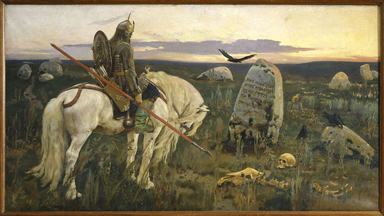
Soldier
Soldiers are always of Malki extraction. Malki are Westerners who worship the Invisible God and whose society is divided in castes. Soldiers are one of these castes; they have been trained to the use of arms and armour since their childhood.
Background: Malki.
Requisites: None.
Primary Characteristics: STR, DEX, SPD, LK.
Talents: Choose a single starting Talent.
Combat:
- Soldiers get their normal combat adds, +1 per level.
- Soldiers can use any weapon.
- Soldiers double the armour points of any armour and shield worn.
Organisation: Soldiers belong to the Malki Soldier caste. They cannot join any Cult.
Templar
Templars are elite Malki soldiers devoted to protecting the presence of the Malki peoples in Pamaltela. Any righteous Soldier who has shown absolute devotion to Malkion, who has undertaken vows of celibacy and poverty, and who has severed all ties to the world but to the Order of the Temple may qualify for membership. Templars are taught the following Wizardry spells, each upon reaching the indicated level:
- Vorpal Blade at character creation
- Poor Baby upon reaching Level 2
- Healing Feeling upon reaching Level 3
- Too-Bad Toxin upon reaching Level 4
- Zap Armour upon reaching Level 8
Wizard
Wizards are necessarily from the Malki peoples, Westerners who worship the Invisible God and whose society is divided in castes. Wizards are one of these castes; they have been trained in casting Wizardry spells since their childhood. Some Wizards specialise in a single school of Wizardry; they are called Specialist Mages.God Learners also train some of their members to become Wizards. Although the God Learner cult originated in the West, they have less stringent caste requirements than their brethren.
Background: Malki.
Requisites: INT & DEX must be equal to or greater than 10.
Primary Characteristics: INT, POW, DEX, CHR.
Talents: Choose a single starting Talent.
Combat:
- Wizards get their normal combat adds – but see below what happens when a Wizard uses a "wrong" weapon.
- Wizards are limited to using weapons whose base damage is less than 3D6. If they wield any other weapon, it will only deal 2D6 of damage, and they will lose their combat adds. They will also be so distracted that they won’t be able to cast any spell.
- A starting Wizard knows all 1st level Wizardry spells. Spells beyond that level must be purchased from the Wizards’ Guild or discovered whilst adventuring.
- A Wizard casts spells of a level lower than his at a reduced cost. The reduction in cost is equal to the level difference, e.g., a 4th level Wizard may cast a 2nd level spell with a reduction of 2 points of POW.
- Wizards do not use Hedge Magic.
Organisation: Wizards belong to the Malki Wizard caste. They cannot join any Cult.
Alchemist
Alchemists are city-based specialists who have been trained in Wizardry but with less emphasis on adventuring and propagation of the faith than fellow God Learners or Wizards. Alchemists operate within the Alchemists’ Guild of Umathela. The guild makes sure that its members charge the expected price for their services, and that the secrets of alchemical skills are never revealed.
Background: Usually Malki.
Requisites: INT must be equal to or greater than 12.
Primary Characteristics: INT, POW, DEX, KNW.
Talents: Alchemy (DEX or INT)
Combat:
- Alchemists get their normal combat adds – but see below what happens when an Alchemist uses a "wrong" weapon.
- Alchemists are limited to using weapons whose base damage is less than 3D6. If they wield any other weapon, it will only deal 2D6 of damage, and they will lose their combat adds.
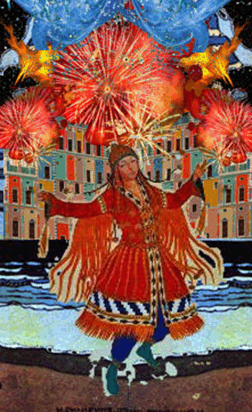 Magic:
Magic:
- A starting Alchemist knows five 1st level Wizardry spells. Any other 1st level spell, and any spell beyond that level must be purchased from the Alchemists’ Guild or discovered whilst adventuring.
- The cost reduction at higher levels is the same as for Wizards (q.v.).
- Alchemists do not "cast" spells like Wizards do – they imbue their potions with the dwimmer-craft of the spell and store them for later use. Alchemists are taught how to prepare the following potion types:
- A Level One skill roll produces an acid inflicting 2D6 hits; costs 5 POW. Ingredient cost per dose: 5 guilders.
- A Level Two skill roll produces an acid inflicting 4D6 hits; costs 10 POW. Ingredient cost per dose: 10 guilders.
- A Level Three skill roll produces an acid inflicting 6D6 hits; costs 15 POW. Ingredient cost per dose: 15 guilders. This is the strongest acid that can be made.
Antidotes
Antidotes are specific to a given substance that must be counteracted. Antidotes last for two hours after having been taken.
An antidote that has been made under a skill roll of a given level will counteract a substance of that same level. So a specific Level Four antidote would counteract all but 1 level of the appropriate Level Five poison.
POW & ingredient cost per dose: as cost of countered agent.
Blade Venom
This is a special type of poison, made for use on a weapon. To negate the effect of blade venom, an antidote must already have been taken.
Blade venom must carefully be applied, i.e., before combat takes place and not during it. One dose of blade venom will coat 5 arrows, 2 spear points, or 1 sword or axe blade. Blade venom is a highly volatile liquid and will have lost its potency by the end of 3 combat rounds (appr. 6 minutes).
- A Level One skill roll produces blade venom subtracting combat adds from the target equal to half the number of hits taken; costs 10 POW. Ingredient cost per dose: 10 guilders.
- A Level Two skill roll produces blade venom subtracting combat adds from the target equal to the number of hits taken; costs 20 POW. Ingredient cost per dose: 20 guilders.
- A Level Three skill roll produces blade venom subtracting combat adds from the target equal to twice the number of hits taken; costs 40 POW. Ingredient cost per dose: 40 guilders.
This is the strongest blade venom that can be made.
Systemic Poison This is similar to the poison found in animal stings. The effect is not immediate – on average 4 minutes after injection of the poison.
- A Level One skill roll produces systemic poison that makes the target lose 1D6 points from CON; costs 4 POW. Ingredient cost per dose: 4 guilders.
- A Level Two skill roll produces systemic poison that makes the target lose 2D6 points from CON; costs 8 POW. Ingredient cost per dose: 8 guilders.
- A Level Three skill roll produces systemic poison that makes the target lose 3D6 points from CON; costs 12 POW. Ingredient cost per dose: 12 guilders. This is the strongest systemic poison that can be made.
Spell Potion When ingested, this potion allows the casting of 1 spell once in a 2-hour period. If it is not used in the 2-hour period, it is eliminated from the body and cannot be used. Use of the spell from the potion does not subtract POW from the user as the POW is already contained in the potion.
POW cost per dose: as spell ×2 (once to give the desired effect, once to keep that effect in the potion).
Power-Restoring Potion To make this potion, an Alchemist must put in twice the number of POW points the potion will restore.
Other Potion Rules Potions spoil if left unused for more than 2 months after making.
An Alchemist may also produce substances that are not analogous to any of the known potions. The game master should determine a level of difficulty for the job, and then should ask the Alchemist to make an Alchemy skill roll at that level of difficulty.
Alchemists do not use Hedge Magic.
Organisation: Alchemists are full members of the Alchemists’ Guild of Umathela. They cannot join any other organisation.
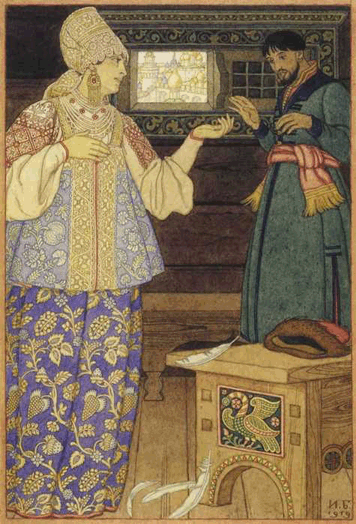
Herbalist
Herbalists are country-based specialists who have been trained in harvesting herbs and medicinal plants, and in preparing simples (medicaments) and apothecary compounds.
Background: Umathing.
Requisites: INT must be equal to or greater than 12.
Primary Characteristics: INT, POW, DEX, KNW.
Talents: Herbalism (DEX or INT)
Combat:
- Herbalists get their normal combat adds – but see below what happens when a Herbalist uses a "wrong" weapon.
- Herbalists are limited to using weapons whose base damage is less than 3D6. If they wield any other weapon, it will only deal 2D6 of damage, and they will lose their combat adds.
Herbalism works like Hedge Magic (q.v.) except that Herbalists do not "cast" spells – they imbue their healing poultices and ointments with the dwimmer-craft of the spell and store them for later use.
Herbalists create poultices and ointments having exactly the same effects as Alchemists’ potions, except that they are not liquids stored in vials but herb packets.
Herbalists do not have access to Wizard Magic.
Organisation: Herbalists do not belong to any organisation. They can join a Cult later on in the course of the game.
Minstrel
Minstrels can be literate troubadours entertaining the courts of dukes and barons in the civilised cities of the coast, travelling bands of players and minstrels earning a difficult living in the markets of Umathelan towns, or rural skalds singing spirit-raising epics when the tribe is marching to battle. Minstrels do not normally adventure in the dangerous ruins of Umathela, but many of them need the extra income brought by these scavenging forays into the unknown, and are also much sought after by delvers who cannot afford the expensive assistance of a Sage or who do not trust being accompanied by a fully-fledged Thief.
Background: Any.
Requisites: DEX must be equal to or greater than 12, and CHR must be equal to or greater than 14.
Primary Characteristics: INT, DEX, CHR, KNW.
Talents:
- Disguise (INT or CHR)
- Influence (CHR)
- Language (KNW or CHR) – choose one foreign language
- Tumbling (DEX)
- Umathelan Cultures (KNW)
- Umathelan Lore (KNW)
- Minstrels get their normal combat adds – but see below what happens when a Minstrel uses a "wrong" weapon.
- Minstrels are limited to using weapons whose base damage is less than 3D6. If they wield any other weapon, it will only deal 2D6 of damage, and they will lose their combat adds.
- Exception: Minstrels may use ranged weapons up to 4 dice.
- If a Minstrel wears too much armour (more than 3 points of protection), his Tumbling skill value is cut in half whilst so encumbered.
Organisation: Minstrels do not belong to any organisation. They can join a Cult later on in the course of the game.
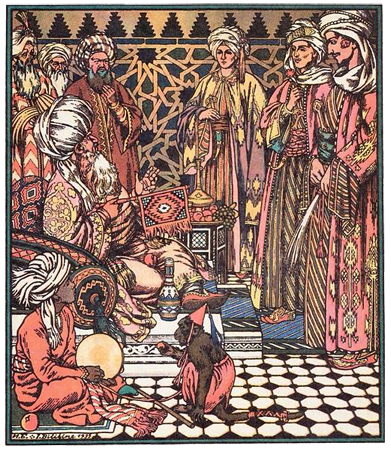
Sage
Sages can be learned men from the cities, respected scholars, or simple rural folk with vast knowledge of their tribe’s legends and lore. Sages do not normally adventure in the dangerous ruins left behind by the God Learners or the Bug-Men, but some of them simply cannot resist the urge to find old artefacts or precious tomes and join adventuring parties. Some others simply seek wealth with which to support their studies.
Background: Any.
Requisites: KNW must be equal to or greater than 12.
Primary Characteristics: DEX, CHR, KNW, LK.
Talents:
- Cartography (DEX)
- Evaluate (KNW or CHR)
- Influence (CHR)
- Language (KNW or CHR) – choose one foreign or ancient language
- Umathelan Cultures (KNW)
- Umathelan Lore (KNW)
- Sages get their normal combat adds – but see below what happens when a Sage uses a "wrong" weapon.
- Sages are limited to using weapons whose base damage is less than 3D6. If they wield any other weapon, it will only deal 2D6 of damage, and they will lose their combat adds.
Magic: Sages may cast Hedge Magic spells normally.
Organisation: The sage-adventurer is an apprentice scholar. Once he is wealthy enough, he can buy his way into a scholarly Cult, such as Ropotes the Wise.
Thief
‘Thief’ is an umbrella term for a wide array of delvers, from honest scouts to wily cutpurses. Most Thieves operate within the Thieves’ Guild of their home town. Independent Thieves quickly learn that they aren’t welcome in civilised cities and must spend the rest of their adventuring lives in the wilderness. These bandits are then actively hunted by law enforcers and guild-affiliated Thieves alike.
Background: Any.
Requisites: DEX must be equal to or greater than 14.
Primary Characteristics: STR, INT, DEX, CHR.
Talents:
- Athletics (STR or DEX)
- Disguise (INT or CHR)
- Engineering (INT)
- Evade (DEX)
- Sleight (DEX)
- Stealth (DEX)
- Thieves get their normal combat adds – but see below what happens when a Thief uses a "large" weapon.
- Thieves are limited to using weapons whose base damage is less than 4D6. If a Thief uses too large a weapon (4 dice or more), he gets only half the rolled combat total, and he doesn’t get any of his combat adds.
- If a Thief wears too much armour (more than 3 points of protection), his DEX rating is cut in half whilst so encumbered.
Organisation: Thieves are full members of the Thieves’ Guild of their home town. They cannot join any other organisation. Non-affiliated Thieves constantly risk undergoing the wrath of affiliated Thieves, as noted above. Tribal scouts do not run this kind of risk as long as they keep to themselves when in town. Tribal scouts can join a Cult later on in the course of the game.
Talents
Talent is the name given in Timinits & Trolls to any skill with a scope narrower than the scope of the characteristics – remember: in Timinits & Trolls, characteristics are actually sets of related skills.Talents may in turn be quite broad (like Athletics) or quite narrow (like Climb Walls). The players have an open choice as to what kind of Talents they prefer. On the one hand, Athletics will enable a delver to climb walls, jump, or walk on a rope. On the other hand, the game master will certainly require a level 3 Athletics skill roll to climb a smooth surface whereas a level 1 Climb Wall skill roll will be deemed sufficient.
Since each Talent is actually a narrower set of skills, it must be based on a single characteristic, to which the result of a 1D6 roll is added.
Delh the Delver has his Athletics Talent based on DEX. His player rolls a 4. Delh’s DEX 15 plus 4 equals an Athletics Talent score of 19.
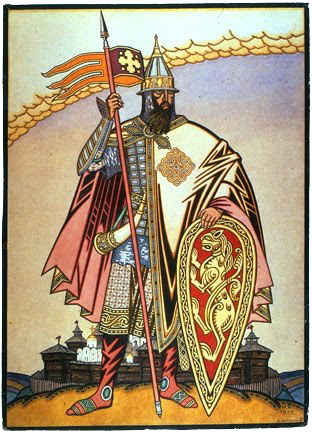
Sample Talents
- Archery (DEX) – This skill replaces DEX for ranged combat.
- Bargain (CHR) – This skill is suggested for ‘trader’ type Journeymen. Each level of difficulty enables the Journeyman to reduce the price of an object by 10%.
- Gambling (LK) – A very useful skill in the cosmopolitan cities of the coast – less so in rural areas, where a gambler may get a taste of the very rough sense of justice of tribal Umathings.
- Swordplay (STR or DEX) – This skill is suggested for Soldiers who have trained for special manoeuvres, e.g., disarming foes, knocking them out, concentrating damage on a single opponent, etc.
- Technology (KNW) – This skill has been devised and taught by those delvers who have specialised in plundering whatever weird artefacts the Zistorites have left behind. A successful roll under Technology will enable the delver to discover how to use a Zistorite item. As always, the game master should determine the level of difficulty for the skill roll.
Acquiring a New Talent
Whenever a player character goes up a level, he gets to choose a new Talent.
Improving Talents
Improving a Talent by +1 costs the same amount of Adventure Points as improving a characteristic by +1, i.e., the skill value times 100.Delh the Delver has an Athletics Talent score of 19. Bringing it up to 20 would cost him 190 Adventure Points.
Why improve a Talent? It would seem wiser to always improve characteristics (since any related Talents go up automatically with their base characteristic). Again this is a question of balancing narrower and broader skills.
Character Advancement
As explained above, character advancement is "bought" using Adventure Points. These are earned by delvers through adventuring (ie, they are handed out by the GM at the end of each gaming session).The GM is the sole judge of how many Adventure Points the player characters should be awarded. A good guideline is 500 times the level of a delver per gaming session.
Part 1: Issue 13, Summer 2012
Part 2: Issue 14, Autumn 2012
Part 3: Issue 15, Winter 2013





